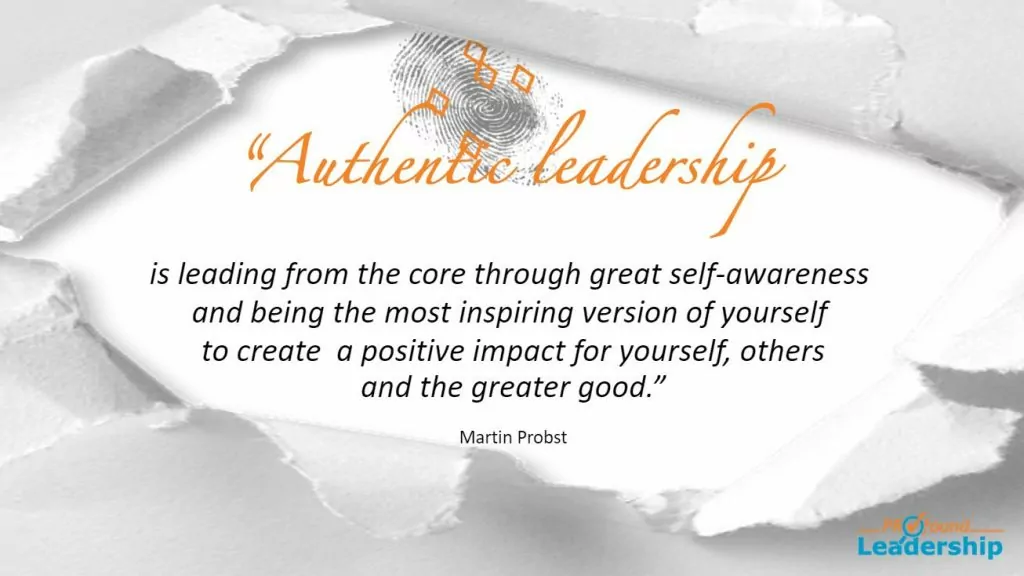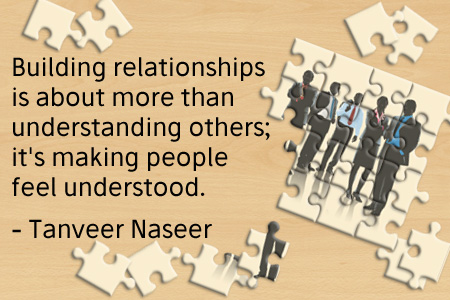Authentic Leadership: Guiding with Integrity and Purpose
In today's dynamic and ever-changing world, the role of leadership has evolved beyond traditional authority to encompass a more profound and impactful approach known as authentic leadership. Authentic leadership is not just a management style; it's a philosophy that emphasizes leading with integrity, transparency, and a commitment to one's values. In this blog post, we will explore the essence of authentic leadership, its impact on organizations and individuals, and how you can embrace its principles to become an effective and respected leader.
Defining Authentic Leadership
Understanding Authenticity
Authentic leadership is rooted in the concept of
authenticity, which involves being genuine, self-aware, and true to one's
beliefs and values. Gardner et al. (2005) highlight that authentic leaders are
not afraid to show vulnerability and acknowledge their imperfections. They are
comfortable in their own skin, which enables them to foster authentic
relationships with their team members.
Alignment with Values
Central to authentic leadership is the alignment of one's
actions and decisions with their core values.
Avolio et al. (2004) stress that authentic leaders avoid hypocrisy by practicing what they preach. This alignment builds credibility and trust among followers, as they can clearly see that the leader's words and actions are consistent.
Transparency and Openness
Authentic leaders practice transparency in their interactions and decision-making processes. Transparency fosters an environment of open communication and trust (Gardner et al., 2011).
By sharing insights into their thought processes and being open about challenges, authentic leaders create an atmosphere where followers feel respected and included.
Leading by Example
Authentic leadership involves leading by example, inspiring
others to emulate the leader's values and behaviors. According to Walumbwa et
al. (2008), authentic leaders demonstrate behaviors that reflect their moral
and ethical standards. This influence goes beyond formal leadership positions,
as authentic leaders inspire through their actions rather than their titles.
Example: Mahatma Gandhi and Authentic Leadership
A quintessential example of authentic leadership is Mahatma
Gandhi, who led India to independence through nonviolent resistance. Gandhi's
commitment to his principles of nonviolence, justice, and equality exemplified
his authenticity. His simple lifestyle, willingness to endure hardships, and
unwavering dedication to his values made him a credible and relatable leader
(Brown, 2015).
The Impact of Authentic Leadership
The impact of authentic leadership extends far beyond
personal attributes; it ripples through organizational culture, employee
engagement, and overall performance. Research findings consistently highlight
the transformative effects of authentic leadership on both individuals and
organizations.
1. Positive Organizational Culture
Authentic leadership plays a pivotal role in shaping
organizational culture. Avolio and Gardner (2005) emphasize that authentic
leaders create an environment characterized by trust, open communication, and
respect. These leaders serve as role models for ethical behavior, setting a
standard that permeates throughout the organization. Such a culture fosters a
sense of belonging and encourages individuals to contribute their best efforts
(Wong & Cummings, 2009).
2. Employee Engagement and Job Satisfaction
Studies have shown a strong link between authentic
leadership and employee engagement. Authentic leaders prioritize open dialogue
and involve employees in decision-making processes, empowering them to take
ownership of their work (Walumbwa et al., 2010). This involvement fosters a
sense of autonomy and empowerment, leading to higher levels of job satisfaction
and commitment to the organization (Leroy et al., 2015).
3. Improved Performance and Productivity
Authentic leadership positively influences employee
performance and productivity. Gardner et al. (2005) highlight that authentic
leaders inspire a shared vision and motivate individuals to contribute their
best efforts. When employees feel that their contributions are valued and that
their leaders genuinely care about their growth, they are more likely to invest
their time and energy into their work (Walumbwa et al., 2008).
4. Organizational Resilience
Authentic leadership contributes to organizational
resilience in the face of challenges. By fostering a culture of open
communication and transparency, authentic leaders ensure that problems are
addressed promptly and effectively. This resilience enables organizations to
navigate setbacks and changes while maintaining a positive work environment
(Walumbwa et al., 2010).
Example: Impact of Authentic Leadership at Whole Foods
Whole Foods Market is often cited as an example of the
positive impact of authentic leadership. Co-CEOs John Mackey and Walter Robb
demonstrated authentic leadership by creating a culture of transparency,
empowerment, and employee involvement. They encouraged open communication,
decision-making at all levels, and shared values with employees. This approach
resulted in high levels of employee satisfaction, low turnover rates, and a
strong sense of community within the company (Brown & Treviño, 2014).
Example: Impact of Authentic Leadership at Google (now Alphabet)
Larry Page, the former CEO of Google, is known for
encouraging open communication and valuing diverse perspectives within the
organization. His commitment to fostering a culture of transparency led to
innovative ideas and a strong sense of ownership among Google employees
(Lashinsky, 2011).
Key Traits of Authentic Leaders
Authentic leaders possess a unique set of qualities that set them apart and enable them to effectively guide and inspire their teams. These traits go beyond the traditional attributes of leadership; they are rooted in self-awareness, empathy, humility, and the ability to build genuine relationships.
1. Self-Awareness
Authentic leaders exhibit a high degree of self-awareness,
which is the foundation of their leadership approach. They understand their
strengths, weaknesses, values, and emotions. By recognizing their own
limitations, they become approachable and relatable. Self-awareness also allows
them to make conscious decisions that align with their values, fostering a
culture of trust and transparency (Gardner et al., 2011).
2. Empathy
Empathy is a cornerstone of authentic leadership. Authentic leaders genuinely care about the well-being and perspectives of their team members. They actively listen to their concerns, validate their emotions, and seek to understand their viewpoints. This trait enables them to create a sense of belonging and connection, fostering an environment where individuals feel valued and supported (Avolio & Gardner, 2005).
3. Humility
Unlike traditional leadership models that often focus on
dominance, authentic leaders practice humility. They acknowledge their own
fallibility and give credit to their team members. Humility creates an
atmosphere of equality, where contributions are recognized regardless of
hierarchical positions. This trait also encourages open communication and collaboration,
as team members feel comfortable sharing their ideas (Gardner et al., 2011).
4. Building Genuine Relationships
Authentic leaders prioritize building genuine relationships
with their team members. They take the time to understand each individual's
strengths, aspirations, and challenges. This approach fosters a sense of trust
and camaraderie, as team members know their leader genuinely cares about their
growth and development. Authentic leaders create an environment where people
feel safe to express their opinions and take risks (Gardner et al., 2011).
In the corporate world, authentic leadership is essential for creating a positive and productive work environment. Self-awareness helps corporate leaders understand their impact on the company culture. Empathy enables them to address the diverse needs of employees, leading to improved morale and job satisfaction. Humility fosters collaboration and innovation, as team members feel valued for their contributions. Building genuine relationships enhances employee engagement and loyalty, resulting in higher productivity and lower turnover rates.
Indra Nooyi, former CEO of PepsiCo, exemplified authentic
leadership in the corporate world. Her self-awareness about her strengths and
weaknesses allowed her to make informed decisions. Her empathy for employees'
work-life balance led to policies that supported their well-being. Nooyi's
humility was evident in her willingness to engage with employees at all levels.
By building genuine relationships, she encouraged open dialogue and
collaboration, which contributed to PepsiCo's success.
For state leaders, these authentic leadership traits are
equally crucial. Self-awareness allows state leaders to recognize the impact of
their policies on their citizens. Empathy helps them address the needs of
diverse populations, ensuring that policies are fair and just. Humility allows
state leaders to admit mistakes and adapt to changing circumstances. Building
genuine relationships with constituents fosters trust and cooperation, leading
to effective governance and citizen satisfaction.
For example, Nelson Mandela's leadership during South Africa's
transition from apartheid to democracy showcased humility and empathy. His
willingness to listen and understand different viewpoints contributed to
national healing and unity (Muthien, 2017).
Developing Authentic Leadership
Becoming an authentic leader is not an overnight
transformation; it's a journey of self-discovery, growth, and intentional
development. The path to authentic leadership involves cultivating
self-awareness, embracing vulnerability, and consistently aligning your actions
with your values.
1. Cultivate Self-Awareness
Self-awareness is the foundation of authentic leadership.
Take time for introspection and self-reflection. Evaluate your strengths,
weaknesses, values, and beliefs. Recognize how your actions and decisions
impact others. Seeking feedback from peers, mentors, or even your team members
can provide valuable insights. The goal is to understand yourself deeply so you
can lead with authenticity (Walumbwa et al., 2008).
2. Embrace Vulnerability
Authentic leaders are not afraid to show vulnerability.
Acknowledge your imperfections and limitations openly. Sharing personal stories
of challenges and growth creates a genuine connection with others. When you
reveal your own vulnerabilities, you create an atmosphere where others feel
comfortable doing the same. This fosters mutual understanding and empathy
within your team (Brown, 2018).
3. Consistent Values Alignment
To develop authentic leadership, ensure your actions align
with your values consistently. Avolio and Gardner (2004) emphasize that
authentic leaders practice what they preach. Regularly assess your decisions
and behaviors to ensure they reflect your core values. When your team witnesses
your unwavering commitment to your values, they'll trust your leadership and be
inspired to follow suit.
4. Seek Growth Opportunities
Authentic leaders are lifelong learners. Engage in
continuous personal and professional development. Attend workshops, seminars,
and conferences to enhance your leadership skills. Embrace challenges and view
setbacks as opportunities for growth. By actively seeking to expand your
knowledge and skills, you demonstrate your dedication to becoming a better
leader (Walumbwa et al., 2008).
5. Build Meaningful Relationships
Invest in building genuine relationships with your team
members. Take time to understand their aspirations, concerns, and viewpoints.
Actively listen to their feedback and involve them in decision-making
processes. When you build authentic connections, you create an environment
where team members feel valued and respected. These fosters open communication
and collaboration (Gardner et al., 2011).
6. Lead by Example
Authentic leadership is about setting a positive example for
others. Demonstrate the behaviors and values you expect from your team members.
When you lead by example, you create a culture of accountability and integrity.
Your actions become a model for your team to follow, and this consistency
cultivates trust and credibility (Goffee & Jones, 2005).
Example: Sheryl Sandberg's Authentic Leadership Journey:
Sheryl Sandberg, Chief Operating Officer of Facebook, exemplifies the journey of developing authentic leadership. Sandberg openly discusses challenges she faced as a woman in leadership and the lessons she learned. Through her vulnerability and commitment to continuous learning, she inspires others to lead authentically. Her actions align with her belief in gender equality, and she actively advocates for women's empowerment through her book "Lean In" and related initiatives (Sandberg, 2013).
Authentic Leadership in Challenging Times and the VUCA world
In an era characterized by volatility, uncertainty,
complexity, and ambiguity (VUCA), authentic leadership takes on an even greater
significance. The VUCA world presents leaders with unprecedented challenges that
demand a genuine and principled approach to guiding individuals and
organizations through uncertainty.
1. Clarity in Uncertainty
Authentic leaders shine brightest during times of
uncertainty. The VUCA world often lacks clear paths and predictable outcomes.
In such conditions, authentic leaders provide a beacon of stability by offering
clear communication, outlining goals, and explaining the rationale behind
decisions. By being transparent about the challenges and potential solutions,
authentic leaders instill confidence and reduce anxiety within their teams
(Avolio et al., 2010).
2. Adaptability in Complexity
Complexity is a hallmark of the VUCA world. Authentic
leaders demonstrate adaptability by staying agile in their strategies and
decision-making processes. They remain open to feedback and new information,
adjusting their approaches as circumstances evolve. This adaptability
encourages innovation and the exploration of creative solutions to complex
problems (Avolio et al., 2010).
3. Navigating Ambiguity
Ambiguity is an integral part of the VUCA landscape.
Authentic leaders embrace ambiguity with a sense of curiosity and resilience.
Rather than shying away from uncertainty, they actively seek to understand the
nuances of ambiguous situations. By encouraging their teams to explore
different perspectives and test hypotheses, they foster a culture of
experimentation and learning (Browning et al., 2017).
4. Empathy in Volatility
Volatility characterizes the rapid and unpredictable changes
that occur in the VUCA world. Authentic leaders respond to volatility with
empathy and compassion. They acknowledge the emotional toll of volatility on
their teams and offer support. By demonstrating genuine concern for their team
members' well-being, authentic leaders build trust and strengthen relationships
(Gardner et al., 2011).
Example: Authentic Leadership in the VUCA World
During the global financial crisis of 2008, the CEO of
Starbucks, Howard Schultz, demonstrated authentic leadership in the face of
uncertainty. He held open forums with employees, acknowledging their concerns
and providing transparent updates on the company's situation. By maintaining
clear communication and a strong sense of purpose, Schultz guided Starbucks
through the crisis, demonstrating authentic leadership principles in a VUCA
environment.
Example: Authentic Leadership in time of Crisis
Dr. Anthony Fauci, Director of the National Institute of
Allergy and Infectious Diseases, exemplified authentic leadership during the
COVID-19 pandemic. His consistent, science-based communication and empathy
instilled trust and helped guide public health decisions (Rosenberg et al.,
2020).
Conclusion
Authentic leadership is not just a buzzword; it's a
transformative approach that empowers leaders to create positive change within
themselves and their organizations. By embodying authenticity, leaders can
inspire trust, foster a culture of collaboration, and lead with integrity. By
embracing growth opportunities, building genuine relationships, and leading by
example, you pave the way to becoming an authentic leader who inspires trust,
fosters collaboration, and positively impacts those you lead.
As you embark on your leadership journey, remember that
authenticity is not about being perfect but about being true to yourself while
striving to make a meaningful impact on those you lead.










.jpg)





.jpg)

.jpg)


Comments
Post a Comment